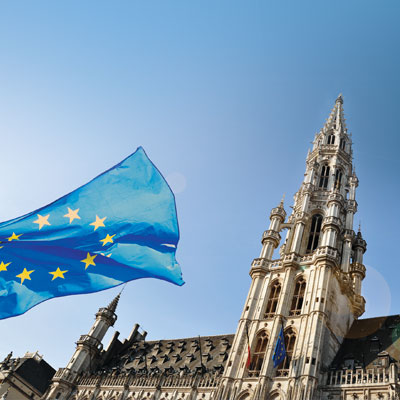Master’s in Multilevel Governance in Europe

Master’s in Multilevel Governance in Europe
Europe and the EU in a changing world
Our interdisciplinary master’s programme in Multilevel Governance in Europe is an advanced postgraduate degree focusing on the challenges and opportunities of governing in a multilevel setting. In the twenty-first century, governing is not taking place only through national governments, but increasingly happens with, within and above states. The European Union is at the forefront of this development. By exploring the multi-level interaction between public actors (Member States, EU institutions, etc.) and private actors (companies, networks, NGOs, etc.) in Europe, this programme provides students with a deep understanding of the policymaking possibilities and constraints related to multilevel governance. This degree is designed for future professionals in European and world politics.
Overview
Multilevel governance involves a tension between solving supranational problems and maintaining broad levels of support among diverse national populations. Europe is a case in point of how multilevel governance is shaped through recurrent multilevel interactions between supranational and national institutions, frequently involving also relevant private actors (companies, networks, NGOs, etc.). Through these interactions, the rules of the game of both European and world politics are recurrently redefined.
This programme provides students with a deep understanding of how multilevel governance is shaped, with the European Union as an object of study from which to draw more general lessons for governance in the twenty-first century. Students will acquire the necessary know-how and the conceptual tools to understand, analyse and act upon problems related to public policy in the European multilevel setting. The study programme will equip students with the skills necessary to steer policies through the complex institutional and political environment of the European multilevel setting, at local, national, and international level.
Career opportunities
- The European institutions: the European Parliament, the European Council, the Council of the European Union, the European Commission, are natural outlets for this training programme.
- European NGOs, Think Tanks, trade unions, interest groups and lobbies often recruit experts with backgrounds in political science and international affairs.
- Businesses are increasingly recruiting people qualified in European studies.
- Academic career: students graduating from our MA can also access PhD programmes in order to pursue an academic career.
Get a video overview
Johannes Karremans
Course schedule
Semester 1 (M1)
Semester 2 (M1)
Semester 3 (M2)
Semester 4 (M2)
Core courses
| European History | 24h | 6 ECTS |
| European institutions and policies | 24h | 6 ECTS |
| Global Governance | 24h | 6 ECTS |
Research courses
| Workshop: Academic Writing | 12h | 3 ECTS |
Optional courses (Choose 1)
| Introduction to Political Science* | 18h | 4 ECTS |
| Advanced Comparative Politics | 18h | 4 ECTS |
| Critical Approaches to International Relations | 18h | 4 ECTS |
| Public Policy Analysis | 18h | 4 ECTS |
Career development (Choose 1)
| Diplomacy in practice | 12h | 3 ECTS |
| Agriculture in practice | 12h | 3 ECTS |
| Digital Politics in Practice | 12h | 3 ECTS |
| Think tanks in EU governance | 12h | 3 ECTS |
| One-day field trip | 8h | / |
Languages
| French (FLE) or English ** | 16h | 2 ECTS |
| Optional extra language course (non-compulsory) | 16h | / |
Core courses
| EU Foreign Policy: Theories and Practice | 24h | 6 ECTS |
| European Economic Governance | 24h | 6 ECTS |
| Cultures and identities in the EU | 24h | 6 ECTS |
Research courses
| Introduction to Research Design | 18h | 4 ECTS |
Optional courses (Choose 1)
| Global Justice | 18h | 4 ECTS |
| Approches socio-économiques de l’agriculture | 18h | 4 ECTS |
| International Migration | 18h | 4 ECTS |
| European Union digital policies in comparative perspective | 18h | 4 ECTS |
Career development
| Studytrip Geneva | 30h | 2 ECTS |
| Career talks | 4h | / |
Languages
| French (FLE) or English ** | 16h | 2 ECTS |
| Optional extra language course (non-compulsory) | 16h | / |
Core courses
| Contemporary Issues in European Politics | 24h | 6 ECTS |
| Measuring the influence of international organizations on governments’ policies | 24h | 6 ECTS |
Research courses
| Political Science Research Approaches and Methods | 18h | 4 ECTS |
| Work-in-progress document | / | 2 ECTS |
| Statistics and the Political Sociology of Quantification | 18h | 4 ETCS |
Optional courses (Choose 1)
| The European Green Deal | 18h | 4 ECTS |
| Cybersecurity | 18h | 4 ECTS |
Career development
| Professionalization workshops | 4h | / |
| Wikifactory I: Research for society | 10h | 2 ECTS |
Languages
| French (FLE) or English ** | 16h | 2 ECTS |
| Optional extra language course (non-compulsory) | 16h | / |
Core courses
| Global and European Political Economy | 24h | 6 ECTS |
Research courses
| Master’s dissertation | / | 13 ECTS |
| ESPOL-Lab seminar participation + students’ seminar participation | 12h | 1 ECTS |
Career development
| Internship | 6 ECTS | |
| Wikifactory II: Research for society | 10h | 2 ECTS |
Languages
| French (FLE) or English ** | 16h | 2 ECTS |
| Optional extra language course (non-compulsory) | 16h | / |
* Compulsory option for students without a background in political sciences
** French (FLE) compulsory for non-francophone students. English compulsory for francophone students. In case the student is a native FR/EN (to be checked by Clarife), replace with other language of choice.
The course schedules are not contractual and are subject to change at any time by the teaching staff.



